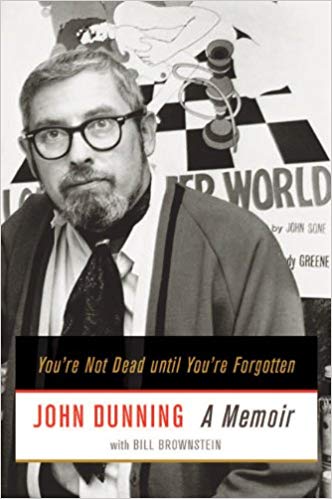 By JOHN DUNNING, BILL BROWNSTEIN (McGill-Queen’s University Press; 2014)
By JOHN DUNNING, BILL BROWNSTEIN (McGill-Queen’s University Press; 2014)
For horror/exploitation aficionados this was one of the standout publications of 2014. The late John Dunning (1927-2011) was one of Canada’s premiere movie producers and exhibitors, with a resume that includes ILSA, SHE WOLF OF THE SS and its sequels, MY BLOODY VALENTINE, HAPPY BIRTHDAY TO ME, DEATH WEEKEND and David Cronenberg’s early features SHIVERS and RABID. It’s no exaggeration to say that Dunning, together with his longtime partner Andre Link, is responsible for jump-starting Cronenberg’s career, along with those of Ivan Reitman (whose MEATBALLS was made under Dunning’s auspices) and many other Canadian cinema luminaries.
This book consists of Dunning’s frank and witty memoir, completed in 2004, followed by about fifty pages’ worth of testimonials about Dunning from Link, Cronenberg, Reitman and many others. According to the testimonials, Dunning, as co-founder of Cinepix, oversaw the artistic aspects of the operation while Andre Link took care of the business side. Yet in his memoir Dunning comes off as thoroughly practical and business-minded, with an overriding concern with commercial viability.
This is especially unlikely given that Dunning was an admittedly meek fellow who suffered from a variety of health problems, as well as a crippling case of sociophobia (fear of social situations) that made him shun the limelight. As related here, Dunning’s existence was one of constant and never-ending stress, beginning in his teens, when he managed his family-owned movie theater in Montreal, where bad behavior by rowdy patrons was a constant. Things didn’t get any less hectic as Dunning matured.
His early ventures into film production were as a distributor, purchasing French films for Montreal screens. It was around this time that Dunning came into contact with Andre Link, and Canada’s answer to Roger Corman was formed. Cinepix’s early output consisted of sexploitation fare like LANA, QUEEN OF THE AMAZONS and VALERIE, as well as a reissue of Tod Browning’s immortal FREAKS and the heavily censored Quebec release of DEEP THROAT, during which Dunning concluded that “Sensationalism could work for us.” Of course, Cinepix had to contend with the maddeningly arbitrary demands of the Canadian censorship board, which make the famously inconsistent rulings of the MPAA seem mild by comparison.
Cinepix’s most successful films were released in the 1970s, although by then the competition was extremely fierce. But Dunning and Link kept going, even in the face of disasters like the arty exorcism drama LA DIABLE EST PARMI NOUS, HOT DOG COPS (a cop comedy that preceded the POLICE ACADEMY flicks but enjoyed none of their success), the overblown Hollywood co-production SPACEHUNTER: ADVENTURES IN THE FORBIDDEN ZONE, THE VINDICATOR (a no-budgeter that Dunning claims spawned ROBOCOP), and MEATBALLS 3 (about which no explanation is necessary).
Dunning doesn’t go into the details of how Cinepix (which became CFP) was bought up by Lionsgate, which retained the services of Andre Link but not Dunning. This is covered fairly extensively in the Testimonials section of the book, which also provides a good accounting of Dunning’s generous nature. According to producer Don Carmody, “I don’t know anyone who worked with John who didn’t like him,” while Cronenberg calls Dunning “the only producer who ever understood me” and “my film school.” For the rest of us, this book stands as a vital testimonial to a neglected slice of Canadian film history and one of its most prominent players.
